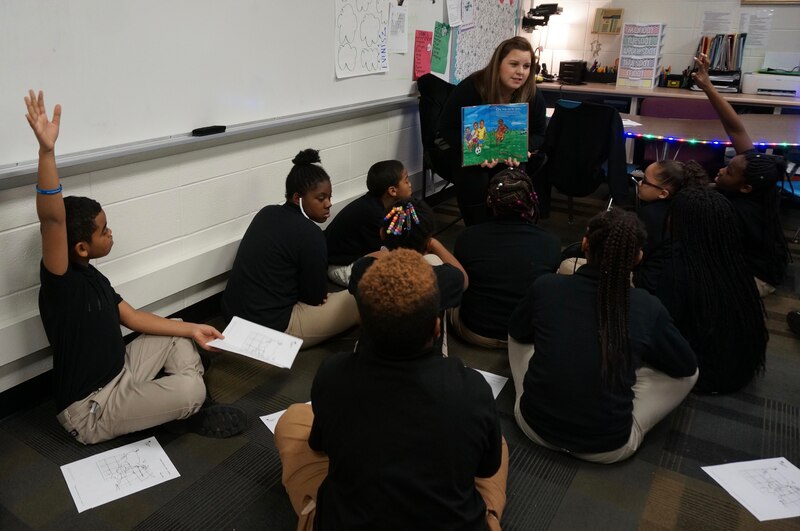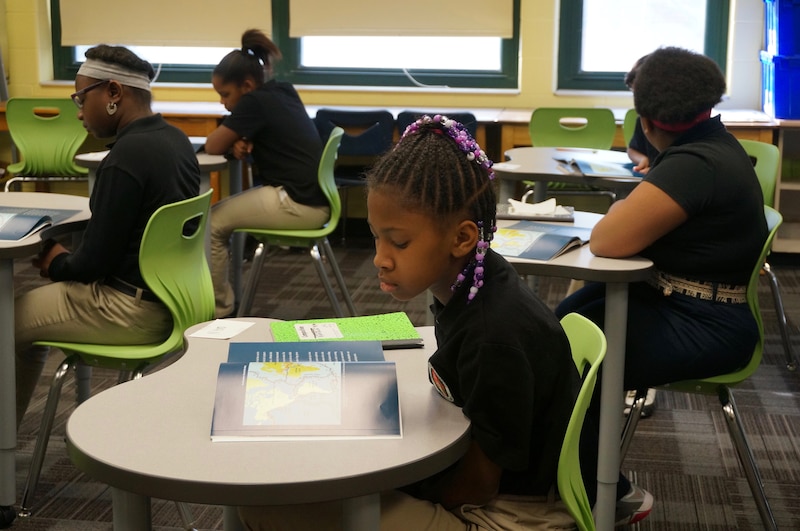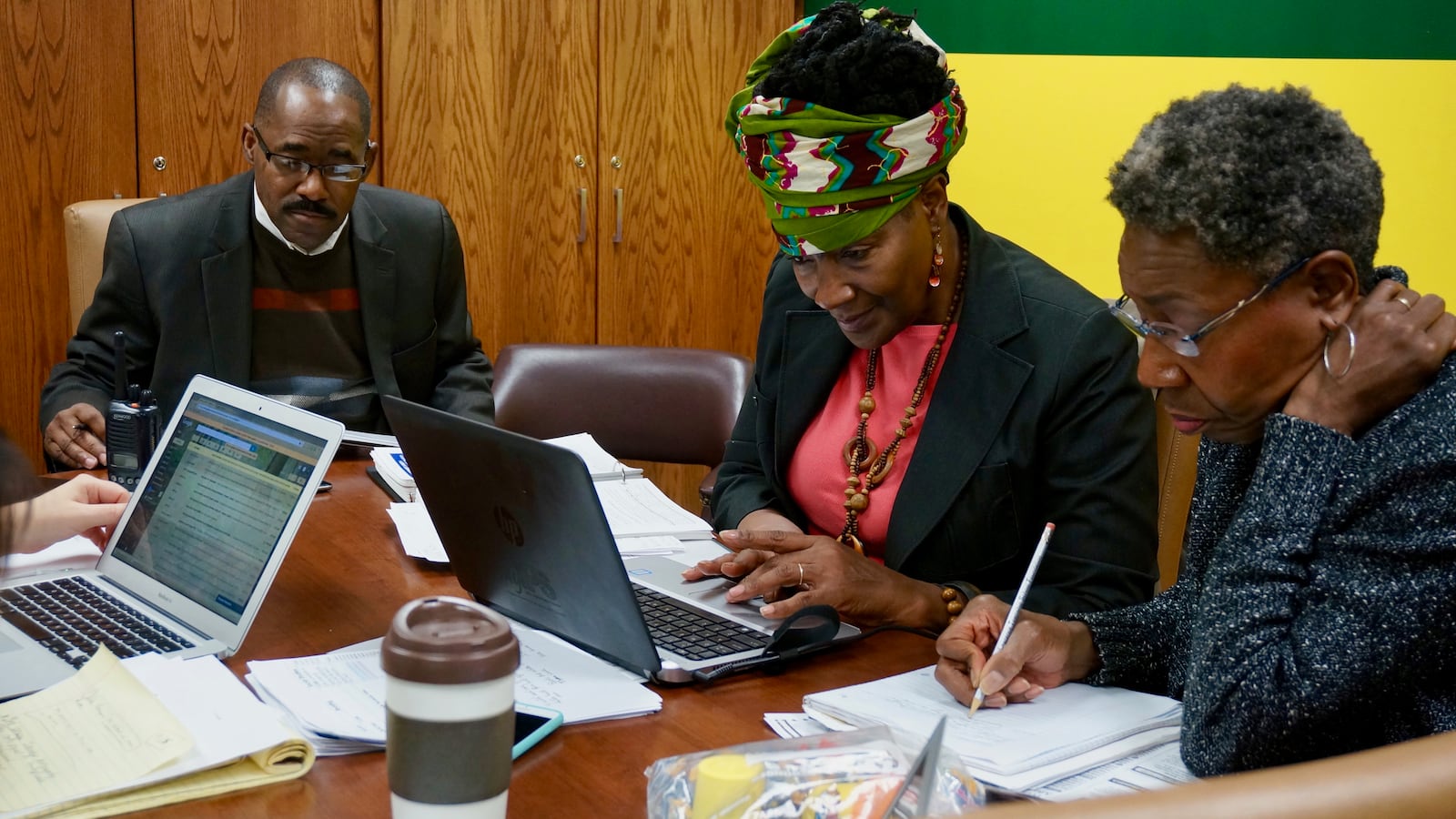On a Monday morning in December, fourth graders at Ignite Achievement Academy at School 42 are learning about earthquakes. In one classroom, students discussed how the earth’s plates move and collide. Down the hall, in a room decked in Christmas lights, teacher Julia Barker read her class a story about a Haitian boy trapped after an earthquake.
It’s a pretty typical day for fourth grade, but in subtle ways, the teachers are trying something new: Infusing Afrocentrism into their classes. The approach, which is being slowly incorporated in classes across the school, aims to move beyond the narrow version of black history schools often teach to highlight black contributions to civilization and leadership.
“We have to start telling the truth about our histories,” said Shy-Quon Ely II, a co-principal at the school.
Students are exposed to the approach throughout their classes. For instance, the focus on black history meant Barker’s class read a book about an earthquake in Haiti in 2010 instead of one in San Francisco in 1906. In another class, led by Jukobie Russell, students learned how the ocean current helped shape the slave trade. And when they studied motion and design, students also learned about transportation modes in Africa.

Ignite school leaders say Afrocentrism is a way of making school relevant and personal for their students as well as instilling a sense of self-worth. It’s the kind of history many of the educators at Ignite seem to wish they themselves had learned in school.
“We were basically, indirectly and directly lied to about a lot of stuff,” Russell said. The only black historical figures he learned about in school were those who were “passive and non-threatening,” he said.
A wave of Afrocentric charter schools opened in the 1990s, but there is little research on whether the approach helps to boost test scores. Martell Teasley, the dean of the the college of social work at University of Utah, led a recent study that found that most Afrocentric charter schools were not meeting federal goals for improving test scores. Poor test scores have left Afrocentric schools in some cities vulnerable to closure.
But although Teasley does not believe Afrocentrism is a panacea for low-performing schools, he said the philosophy has benefits for helping people connect with their heritage.
School 42 is in a poor community on the northwest side of the district. Last year, 12.7 percent of students passed state tests in both math and English, about half the district average. After years of failing grades from the state, Indianapolis Public Schools converted the school to innovation status this year and brought on Ignite to manage the campus.
It is still a neighborhood school, but daily operations are handled entirely by Ignite, which was founded by two principals, Ely and Brooke Beavers, who previously co-led an elementary school in the Tindley charter network.
Nearly 80 percent of Ignite students are black, and more than 96 percent are students of color. The school has prioritized hiring diverse teachers, going to hiring fairs as far as Georgia. Fifty-five percent of their staff are people of color, and a third are men.
Beavers said that ultimately, the aim is to inspire students to become leaders who are connected to their community.
“This is a long-term goal that our children come back and they return to this community and want to make it better — they don’t flee from it,” Beavers said.
Russell, who has taught for about a decade, said Ignite’s approach is a sharp contrast to the black history that is taught in most other schools. When he was at a previous school, for example, a teacher started a black history month timeline with slavery, recalled Russell, who is black. “We didn’t come from slaves.”
Infusing Afrocentrism into his teaching has been a relatively easy transition for Russell. He was frustrated by how history was taught at his previous job, and one of the main reasons he chose to come to Ignite was the Afrocentric approach.
But for some other teachers, the curriculum is an adjustment.
In part, that’s because lots of the material they are teaching students is new for them, said Barker, who is in her second year of teaching and is white. Before she started teaching it at Ignite, for example, she wasn’t aware of how ancient Egyptians used solar energy, she said. That means she is sometimes learning history in order to teach it in her class.
“I’m learning myself,” she said. “We are at the very early stages, but I think it’s very important.”

The school is trying to make the Afrocentric approach as a seamless as possible for teachers who are not steeped in black history by giving them easy access to materials. They have worked with the Historic Journey to create a guide that pairs the subjects students are studying with Afrocentric books and history. Staff from the Historic Journey also regularly visit the school to talk with teachers about how they are using the material and observe them in class.
The Historic Journey is based in Indianapolis and they have worked with other schools in the city’s largest district, as well as schools in Pike and Lawrence townships. But Gary Holland, who founded the program about 7 years ago, said that Ignite is one of the first schools he has worked with that paired the Historic Journey materials with what students are learning school-wide, so teachers do not need to do that work on their own.
Incorporating African history into the school takes work. Educators need to fit it with state guidelines. Teachers have to learn the history they are teaching and find time for to cover new subjects in crowded days. And the school has to offer training and guidance.
But ultimately, school leaders believe it will pay off for students. As one of just a few black students in his classes growing up, Ely hated studying history. When classmates talked about slavery, he wondered if they were thinking about him. The civil rights movement was compressed to a few figures and viewpoints.
That changed for Ely in college, when he started learning a broader version of black history.
“Once I had a perspective of who my ancestors were before, and their contribution to the civilizations that are in power now, that totally gave me a confidence that I didn’t have before,” he said. “I want … (students) to grow up with that confidence.”

